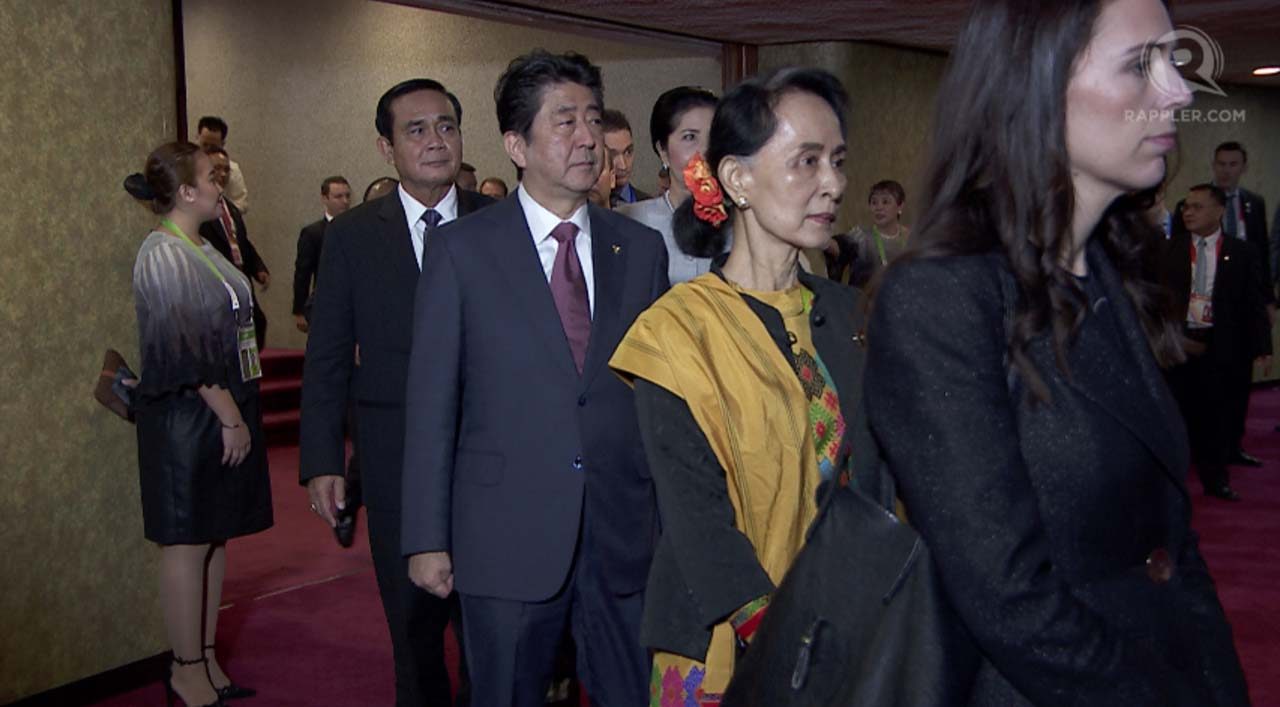SUMMARY
This is AI generated summarization, which may have errors. For context, always refer to the full article.

MANILA, Philippines – Raising the Rohingya issue was but a box to be checked in ASEAN’s to-do list.
This was the impression of human rights advocate Philem Kine, Deputy Director for Asia of Human Rights Watch, after the plight of Rohingya was raised at the Association of Southeast Asian Nations (ASEAN) Summit Plenary on Monday, November 13.
“What ASEAN and Myanmar had done today is that they’ve checked the Rohingya box and said we’re looking at the humanitarian aspects without a whisper of the fact that this human rights catastrophe has been inflicted by the Myanmar security forces and continues even while we speak,” he told Rappler.
“There’s no mention of accountability for those crimes.”
Philippine Presidential Spokesperson Harry Roque told media on Monday that “2-3 countries” raised the issue in the plenary, and Myanmar responded.
“Myanmar specifically addressed Rohingya issues. Myanmar specifically said one, they are in process of attending to Kofi Annan report. Two, they welcome humanitarian assistance. And that the process of repatriation of IDPs (internally displaced persons) would conclude after signing of a Memorandum of Understanding with Bangladesh. There were no further details mentioned by Myanmar.”
Roque was referring to the report by the Kofi Annan Foundation from the Advisory Commission on the Rakhine State, a product of one year of consultations held across the state and in other parts of the country and the region.
The final report, chaired by Kofi Annan, includes recommendations specifically on citizenship verification, rights and equality before the law, documentation, the situation of the internally displaced, and freedom of movement, which affect the Muslim population disproportionately.
But analysts said addressing the report would not be enough.
“Generally speaking, saying that the Kofi Annan report will be addressed does not necessarily mean any progress can be made,” said Jera Lego, research associate at an international research institute in Tokyo.
“The Rohingya are only one of many ethnic groups living there alongside Buddhist Burmese and Burmese Muslims (different from the Rohingya), and these other groups would have their own complaints (founded or unfounded). Simply welcoming humanitarian relief, without saying to which groups this relief will go does not suggest any progress.”
She also pointed out that the report was commissioned by Aung San Suu Kyi who represented Myanmar at the Summit, and that the report “doesn’t use the word ‘Rohingya’ except when referring to armed groups.”
“So now I’m not surprised that Myanmar promises to abide by it,” she said.
Since late August more than 500,000 Rohingya have fled an army campaign in Myanmar’s Rakhine state that the United Nations has denounced as ethnic cleansing.
Myanmar authorities argue the military operations in Rakhine are to root out militants following attacks on police posts in late August.
A recent report by the UN human rights office accused Myanmar of seeking to permanently expel the Rohingya, by planting land mines at the border with Bangladesh where the refugees are seeking shelter.
UN rights officials spoke to refugees who gave accounts of soldiers surrounding homes and firing indiscriminately as residents ran for their lives, and of uniformed men gang-raping women and girls, some as young as 5.
Not enough
Kine echoed Lego, saying the discussion appeared to miss the most crucial points.
“The mention of the Rohingya at ASEAN has really papered over the key issues. The references to the Rohingya issues is often about the humanitarian assistance and aid,” he said.
“Essentially, ASEAN and Myanmar are spinning this as a humanitarian issue without connecting it to the fact that this is an absolute human rights crisis that was caused by, inflicted by, Myanmar security officials and forces and with the apparent passive and active support of elements of the Myanmar government.”
He was also pessimistic that it would be discussed further or in detail during the summit.
“So, the way the ASEAN is engaging on this issue does not address the root of the issue. It pays very cynical lip service to a very human rights issue. That’s probably all we would hear about it,” he said.
Lego too was cautious.
“They may promise to make an effort to improve conditions in the Rakhine state, but this doesn’t obligate them to recognize discrimination and oppression specifically directed against the Rohingya.”
Matthew Wells, Amnesty International Senior Crisis Advisor, said that even if the Rohingya crisis is part of the ASEAN discussion, the time for action to respond is “long overdue.”
“In particular, ASEAN should work to ensure immediate, unfettered aid access throughout Myanmar, and also impose a comprehensive arms embargo on the country as well as targeted financial sanctions on senior officials responsible for serious violations,” he said. – with reports from Jodesz Gavilan and Agence France-Presse/Rappler.com
Add a comment
How does this make you feel?
There are no comments yet. Add your comment to start the conversation.